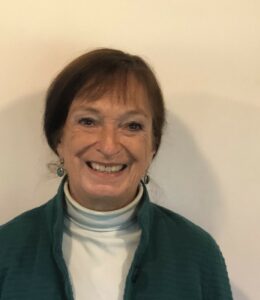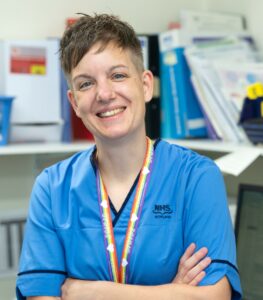Edinburgh Access HPBL Listening Session, Part 2
Inger McGowan QN and Michele Stranger Hunter

Michele Stranger Hunter

Inger McGowan
In Part 1 (see here) Inger McGowan QN reflected upon her lived experience working as a Practice Nurse at the Edinburgh Access Place, especially its weekly Women’s Clinic. Her blog explains the context in which she and her colleagues operate, what she has observed, and the lessons she has learned about sexual and reproductive health from discussions with her patients. These have important implications for her practice, but also for her work on the Steering Group for QNIS’ Healthier Pregnancies, Better Lives (HPBL) programme.
In Part 2, HPBL Consultant, Michele Stranger Hunter explores the views of the women participating in these one-to-one Listening Sessions and her own reflections upon their meaning. The Listening Sessions were conducted as individual interviews with patients registered at Edinburgh’s Access Place. The Access Place is a fully integrated service between NHS Lothian and the City of Edinburgh Council. It offers access to dozens of services under one roof, including Primary Care, welfare & benefits advice, Women’s only clinics, vaccination programmes, temporary and permanent accommodation, and social work support, to support the needs of Edinburgh’s most vulnerable homeless population.
There was considerable concern that, because Women’s Clinic (and other Edinburgh Access Place) patients had experienced trauma and were particularly vulnerable and traumatised, they would not be comfortable talking in the usual group setting. The patient-practitioner relationship is built on trust. If the client doesn’t feel safe, then she will not attend or contribute. At the same time, Inger and her colleagues wanted to be sure that the concerns and perspectives of their patients were respected, solicited, and given voice. Their decision was to proceed with HPBL Listening Sessions as individual interviews.
Unfortunately, with COVID, pressures on staff, and client crises, several of the intended interviews were made impossible. The two women who did participate had both migrated to the UK and were well informed about sexual and reproductive health.
I was surprised by this because it represents a noticeable outlier from all the other clients and patients involved in HPBL Listening Sessions. They were both extremely well versed in how to prepare for a pregnancy; so much so that they would be able to teach practitioners how to talk about it. I asked Inger about the reasons why.
She replied: “They were well educated in general and grew up in a different country. Despite both of them telling me that they had little sex education when younger – and also growing up in a culture where talking about sex and being open about sexual activity and contraception was quite taboo – they both educated themselves really well later in life about preconception health. Despite finding themselves homeless, they are both more stable than most of the patients that I work with.”
Part of my role is participating in all the HPBL Listening Sessions. Having heard the women at all the other sites, I was floored by the reproductive health knowledge these two women expressed. Hearing the taped audio (in recognition of their extreme vulnerability, I was not in the room), I wished they could present their advice to practitioners on how to talk to patients/clients about these deeply personal issues. Not only were they clear about what should be said and how it should be said, they emphasised how much this conversation about pregnancy desires and preparation needs to happen.
In their interviews, they both talked about reading and seeking information on contraception and preconception health themselves. They took the initiative to find out exactly what to do to have a healthy baby.
Culturally, they were not used to discussing anything about sexual and reproductive health. They were surprised to be asked such direct questions about their sexual activity. In Scotland, such questions asked by a community nurse are acceptable. At first, they expected to be judged and were defensive, but quickly realised Inger was both trustworthy and there to help. They both expressed appreciation for having the opportunity to talk about their concerns and ideas.
Here are key excerpts:
“Scotland is amazingly open about sex. Sex is normal. How are you taking care of yourself so you do not get pregnant, and always making sure you have enough contraceptive supplies.”
In terms of how patients should be educated, they had specific advice. They love to receive information from the practitioner about how to stay healthy, how to have a healthy baby, and all the risks they might encounter.
“Present the information factually. Don’t make it personal. Explain the issue and ask should we talk about that. Be clear you are coming from a place of concern. Explain why you are asking. Offer leaflets and brochures. We want to read before we come for a visit so we can ask follow-up questions.”
“Educate women about menstruation; what is normal, what is not, and what to do about it.”
Asking about pregnancy desire would be welcomed.
“Information is vital before you get pregnant; vital to have healthcare and self-care. Who are you sleeping with? is this desire for pregnancy something you share? If you are sexually active, how are you making sure you won’t get pregnant until you’re ready.”
Say it directly, say consequences on baby. “I’m just showing you your future if you continue on this way. A wake-up call. I want you to be healthy, I want the best for you.”
Communication must be soft and powerful!
“If I trust you, I will hear you. If I don’t trust you, I would feel offended and want to move away from you.”
“Treat patients in the lovely way that you like to be treated and how you would suggest treating others. Say: ‘You want to get pregnant. I want to support you. If we could work together for a little while and help you – quit smoking, get your weight down first, or stop drinking – you could have a much healthier pregnancy.”
“Asking about pregnancy desire should be a must. Professionals have to open up and ask the questions.” “Information must be delivered one on one but send home with written information and links to more information.”
This advice is right on target with the guidance I have shared with practitioners over the last decade. Committed to quality care, many practitioners are reluctant to ask about pregnancy desire out of their concern that it is too personal or intrusive a question.
Instead, we should take to heart – and put into practice – the advice these two vulnerable women offered. I hope their messages will be heard as widely, and taken as seriously, as possible throughout Scotland. The Healthier Pregnancies, Better Lives programme can be a vehicle for this to happen.
Please be part of the solution by contacting us at HPBL@qnis.org.uk and/or @HPBL_Scot.